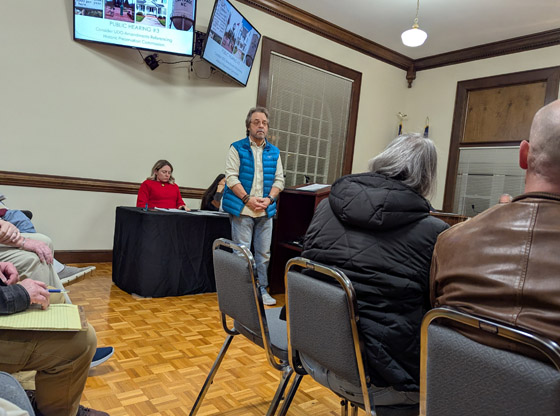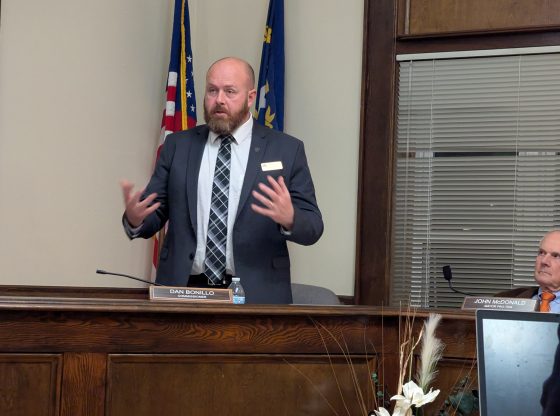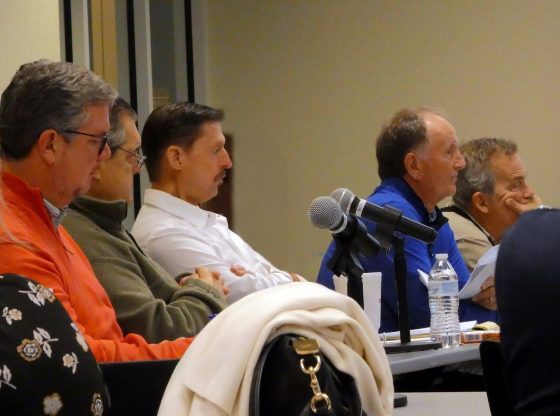The Town of Carthage removed the Historic Preservation Commission (HPC) from Section 100.35 of the Unified Development Ordinance (UDO) at its Feb. 17 agenda meeting because officials believe in the autonomous preservation of historic properties by owners without the need for more authoritative government.
According to town officials and public speakers, if the town had voted for the HPC in its UDO, knowing it did not yet have an official historical district overlay, design standards, or rules, the town would be accepting the unknown.
Of the 16 speakers, including two letters read aloud at the public hearing, only four wanted to continue the HPC.
HPC member Ian Lumgair said when an existing material is already in use within a historical district, property owners may use it without asking for HPC’s approval with a Certificate of Appropriateness (COA), eliminating some financial concerns.
The four in favor of the HPC said regulations would prevent further loss of historical property and stop invasive development, and the organization was still developing and needed more time and wanted to expand the historical district.
Commissioner Dan Bonillo said the HPC wanted to safeguard the historic properties and had good intentions, but without financial incentives, such as grants and low-interest loans, the “HPC would be on the backs” of historic property owners, and he wanted to prevent the town’s harmonic desecration.
HPC member Patty Kempton said HPC leaders who mismanaged it from the beginning had demonized the organization with civility issues.
“There is no mention of collaboration with owners of properties,” Old Buggy Inn building owner and HPC member Scott Chase said about HPC missing the mark on preservation requiring relationships and negotiations, not authoritative government.

When Greg Pilson, an HPC member, traveled to Scotland, members questioned HPC’s integrity because they attempted to pass a list of rules without his input, and he did not receive an answer as to why there was a rush.
Chase said he spent six figures restoring the Old Buggy Inn, and other historic property owners had also bought properties, made repairs and became invested in the community, and properties within the honorary historic district are eligible for tax credits without more government from HPC.
Carthage Town Attorney Brad Herman said the HPC’s broad language within the general statutes was not practical, and if the town wanted to apply the HPC rules to only new construction, it would have legal hurdles.
Read details about North Carolina’s General Assembly rules on historic preservation at G.S. 160D-941.
Concerned attendees learned that current regulations allow a mobile home or manufactured home on a vacant lot next to historic homes and that it already exists.
Commissioners and public speakers did not want mandatory approval for repairs or HPC’s supplement rules against invasive development. The dream of preserving Carthage’s historic homes and its charm died when the town voted against the HPC instead of allowing the HPC to reconfigure and slow down to work on relationships that foster positive change because while change is inevitable, the type of change is manageable.
Carthage Town Hall’s small meeting area filled to standing-room capacity as public speakers listed the following concerns:
*Retirees and others with limited income would have to make tough choices to meet HPC’s requirements and make repairs that match the organization’s standards.
*Citizens want to make their own decisions on repairs without time-consuming COA approvals.
*The HPC control shows a lack of trust in the community and created a power struggle because rules gave more power to the government.
*Real estate prices would increase.
*As the historic district would thrive, homeowners would become burglar bait because they would appear wealthy, and burglars would make dogs bark and disturb homeowners.
Feature photo: Carthage Dan Bonillo explains why he will vote against the Historic Preservation Commission at the Feb. 17, 2025, meeting.
~Article and photos by Sandhills Sentinel journalist Stephanie M. Sellers. Stephanie is also an English instructor at Central Carolina Community College. She is the author of young adult fiction, including When the Yellow Slugs Sing and Sky’s River Stone, and a suspense, GUTTERSNIPE: Shakespearean English Stage Play with Translation, and a new upcoming release published by Golden Storyline Books, a science fiction, Amagi.
To sign up for the free Sandhills Sentinel breaking news and weekly e-newsletter, please click here.




















Comments
Comments are closed.